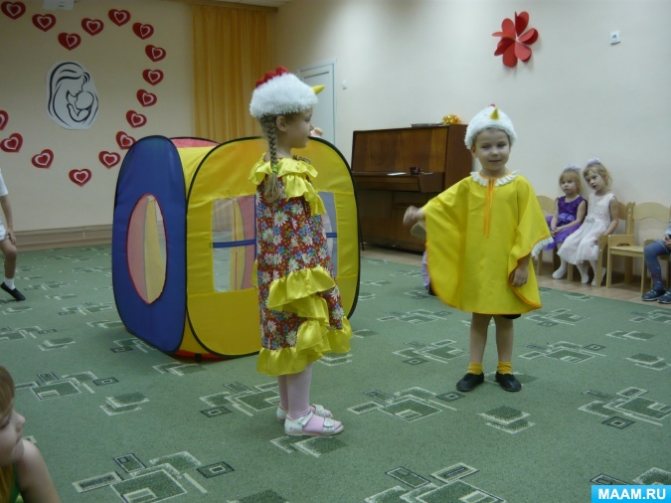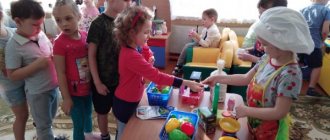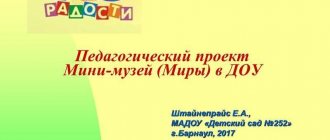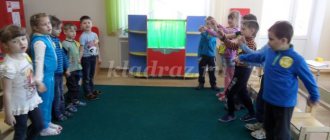The current stage of development of preschool education is characterized by a rapid pace of introduction of innovative technologies into the practice of kindergartens. Federal state educational standards suggest that the construction of the educational process in kindergarten should be based on a comprehensive thematic principle. Therefore, a theme week in kindergarten becomes the basis for planning and organizing work in a preschool institution.
A thematic week, in which the entire educational process is built around a theme, has great potential for the development of preschoolers.
A thematic week in kindergarten allows children to have many opportunities for practical activities, basic experimentation, the formation of basic skills, and the development of mental functions. It unites all types of children's activities in kindergarten, makes them interesting and varied, and most importantly, useful for children. In addition, the thematic week allows the use of a regional and cultural component in the educational process.
Our kindergarten carries out its activities using the approximate basic general educational program of preschool education “From birth to school” N.E. Veraxes. According to the recommendations of the program, when planning the educational process, we pay attention to one topic for at least one week. Similar thematic weeks are introduced in different age groups. This serves to systematize and deepen knowledge, as well as continuity in the development of children throughout preschool childhood.
Taking into account the individual and age characteristics of children, to solve educational problems we determine a range of generally significant topics, as well as topics of interest to children. Thematic weeks are included in the group’s long-term educational work plan for the academic year , which is agreed upon with the senior kindergarten teacher.
The planning of thematic week titles is influenced by:
- educational objectives,
- time period of the year
- children's age.
For example, this is what long-term planning of thematic weeks in the first junior group looks like.
Federal State Educational Standard for Educational Education "Thematic days in the educational process."
Many articles from work experience have been written about how interesting it is to organize the lives of children in kindergarten. Teachers develop scenarios for classes, holidays and entertainment, materials for project activities and much more. All this is just as important as designing a holistic model for organizing the educational process for the entire academic year, including these individual events. In other words, create a system and consistency in planning the educational process.
Pedagogical tasks in all educational areas of FG'OS DO are implemented in the educational process of kindergarten. Each institution independently designs a model for organizing the education and upbringing of preschool children and draws up its own basic educational program.
The principle of comprehensive thematic planning, taking into account the integration of educational areas, involves the inclusion of thematic weeks, thematic days, and thematic walks.
Let's try to understand these concepts. All original variable educational programs for each age group present topics for the entire school year, which are usually used by educators.
The selection of topics makes the educational process systematic and is aimed at expanding the child’s awareness of the world around him.
A creative approach to modeling the educational process assumes that the teacher independently (at his own discretion) can partially or completely replace the topic, adjust the content of the work, and include a regional and cultural component, taking into account the characteristics of his preschool educational institution.
If you look into history, the thematic principle of organizing the educational process in working with preschoolers was proposed by many specialists.
Belgian educational psychologist, doctor J.O. Decroli (1871-— 1932)
in his work “The School of Life for Life” he wrote: “My goal is to create a connection between the sciences and make them converge in one center. This center is the child to whom everything converges and from which everything diverges.” He created the “School of Life through Life” for children, where “interest centers” were developed for preschoolers, the essence of which was to organize children’s work around topics that meet children’s interests and needs. In these centers, children observed, read, wrote, drew, and sculpted things that were related to the topic given to them.
In modern practice, speech therapists actively use the thematic principle of planning and organizing work with preschoolers, selecting a variety of material on topics. E. Alyabyeva’s book “Thematic days and weeks in kindergarten” by the publishing house “TC Sfera” has long been in high demand among educators.
Answering the question “What is a theme day in kindergarten?”, we can say that for children it is an unusual day. It is filled with surprises, games, riddles, and exciting journeys. On this day, children learn a lot of new, useful and interesting things, they are sure to make something, draw, and fantasize. On this day, something changes in the group room: new toys appear, favorite cartoon and fairy tale characters come to visit, and sometimes a puppet theater comes.
For the teacher, the theme day is pedagogical creativity, ingenuity and transformation. This is serious planning of all routine moments, a departure from the traditional outline plan to drawing up a scenario for the day as a whole or its components - routine moments. To make this day memorable for children, the teacher comes up with surprise moments, elements of involving children in games and exciting activities.
In an ordinary, traditional day, the basis is the routine, and the content is, as it were, strung together with routine moments. Often, a morning reception, gymnastics, or a walk in their content may not be completely combined with the content of the educational activity itself and exist on their own.
The difference between a themed day and a traditional one is that at the center of the pedagogical process is a theme chosen by the teacher for educational purposes and combined with a holiday or calendar event. The theme of the day sets the content, which is implemented in various types of children's activities (play, communication, cognitive-research, perception of fiction and folklore, self-service and basic household work, construction, visual, musical and motor).
A game (role-playing, directorial, dramatization, with rules, etc.) is also one of the forms of content implementation. Considering the game as a free independent activity for children, the teacher thinks through how most of the content of the thematic day can be implemented. Thus, in older groups, travel games appear, for example, in time. And then the interested participation of children according to the principle “let’s come up with some more…” saturates the educational process with the interests of children, and not just adults. They become not performers, but active participants in the simulation of such a game.
When organizing a theme day, the content of the educational areas is naturally integrated. This allows the teacher to integrate educational activities and avoid unjustified fragmentation of children's activities into educational areas. During such days, the teacher shows his creativity, takes into account the characteristics, level of knowledge and skills of the children in his group.
A theme day is about immersing children in a topic, which gives them the opportunity to realize and feel what the teacher wants to convey to them.
The theme of the day can be the same for all age groups or chosen only for a specific age. For example, on the first day of summer (June 1), World Milk Day is celebrated (as proposed by the UN Food and Agriculture Organization since 2001). The purpose of the holiday is to popularize milk and dairy products, inform the population about activities related to dairy production.
On this day, the preschool educational institution can organize fun milk-themed performances with fairy-tale characters, games and sports competitions. Stories about the benefits of milk, dishes that can be prepared using it, and treating children to milk will make this themed day not only fun, but also delicious. A thematic day can be organized for all groups at the same time, but each teacher selects his own content and forms of organizations, focusing on common events (entertainment, performance, competition, etc.).
A single theme in different age groups ensures the achievement of unity of educational goals and continuity in development from age to age.
When drawing up a scenario for a thematic day, it is important for the teacher to observe several important conditions:
- be able to objectively assess the level of one’s work, the actual situation and conditions in which educational activities are carried out at the time of planning (what the children and I have already gone through, what results have been obtained);
- be able to identify goals and objectives, correlating them with the educational program, age composition of a group of children, priority areas of the entire educational process in preschool educational institutions;
- clearly represent the results of the work that must be achieved (what new children will learn, what they will learn, what personality traits they will develop);
- choose the optimal forms, means, methods that help achieve your goals, and therefore obtain the planned result.
The plan-scenario of the thematic day should ensure the unity of the educational, developmental and training goals and objectives of the education of preschool children and the integration of educational areas.
I would like to remind you that the principle of integration of educational areas underlies all the work of the educator, and, in our opinion, it is not at all necessary, after planned work, to constantly indicate in brackets which educational areas this or that activity belongs to.
With the introduction of the Federal State Educational Standard for Preschool Education and following the logic, it can be argued that if the educational process in kindergarten unfolds in a complex thematic model and educational tasks are implemented not only in the classroom, but also in routine moments according to the developed daily scenario in each group and throughout the kindergarten .
In our kindergarten, theme days are included in the educational program. And this was done quite creatively, without driving the teacher into another “trap” - obligatory! A collection of interesting themed day scenarios is created through the creative efforts of the entire teaching staff. Each scenario is actively discussed both before and after the theme day, and only the successful ones are kept in the kindergarten teaching room. This work experience may be useful to other educators in the future. This makes the model of our educational process diverse and is reflected in the educational program of the kindergarten.
In comprehensive thematic planning, the requirements for the conditions for the implementation of the preschool education program are observed, one of which is “the use in educational activities of forms and methods of working with children that correspond to their age and individual characteristics (the inadmissibility of both artificial acceleration and artificial slowdown of children’s development)” ( Federal State Educational Standard DO).
Our teaching staff independently decides how often themed weeks, themed days, and themed walks will be planned. We are sure that there cannot be strict regulation here.
The principle of complex thematic planning and its inclusion in the model of organizing the educational process is being developed and widely discussed at teacher councils.
Read online “Thematic days and weeks in kindergarten. Planning and notes"
UDC 373 BBK 74. 100. 58 A60
Alyabyeva E. A.
A60 Thematic days and weeks in kindergarten: Planning and notes. - M.: TC Sfera, 2005. - 160 p. (Development Program).
ISBN 5-89144-519-0
The themed days and weeks presented in the manual, spent during the holidays and throughout the year, will help make the life of children in kindergarten more interesting, varied, and entertaining. Creative ideas will serve as an example of a teacher’s non-standard thinking, departure from routine, cliches in working with children of the second youngest, middle, senior and pre-school groups of preschool educational institutions.
For educators, speech therapists, methodologists and deputy heads of preschool educational institutions.
BBK 74. 100. 58
Klena Alekseevna Alyabyeva
THEMED DAYS AND WEEKS IN KINDERGARTEN: PLANNING AND NOTES
Editor-in-Chief V.V. Dremova Editor O.A. Orlova
Proofreaders L.V. Petrova, L.B. Uspenskaya Artist E.V. Kustarova Computer layout by T. N. Poloyuvoy Transparencies of the text were made in the Sfera shopping center. The cover used a photograph from the State Department No. 1678 of the North Administrative District of Moscow
License ID No. 02242 dated July 5, 2000. Hygienic certificate No. 77. 99. 02. 953. D0025Zh04. 03 from 1 1.
04.200′ i.
Signed and stamped 11/25/04. Format 60×907.
Printing paper. Taime headset. Offset printing. Uel. and a Yu. o Circulation 10,000 ak1. Sunset No. 4618.
Publishing house "TC Sfera". Moscow,
Selskhochiapstiennan st. , IS, corn. 3. Tel. : (095) (>50 l0\ 10/ U)-15.
Printed from ready-made slides at the Federal State Unitary Enterprise of the Order “!n,w I Bim-… …. .
Smolensk Regional Printing House named after VM ('mirnitsa 214000, Smolensk, Avenue named after K) I, desks, d
ISBN 5-89144-519-0 LLC III (-fora), 2005
From the author
They started talking about thematic planning of educational work in preschool educational institutions about ten years ago, when the need arose for a new approach to the psychophysical unloading of children during the winter and summer holidays. The experience of several kindergartens was covered in articles in the magazine “Preschool Education”, which provided approximate topics for the days and a brief outline of the content of the classes.
I present to the readers the development of a scenario version of thematic days and weeks.
Classes with children are based on the technique of immersing children in a topic, which gives them the opportunity to deeply understand and feel what the teacher wants to convey to them. The topic does not limit the possibilities of planning different types of activities, development tasks, training and education of children, it is only a framework that allows you to combine all types of children's activities, make them interesting, and as useful as possible for children.
The scenario version of the lesson is designed for a sequence of events in the logic of the context, the presence of a game character who helps the teacher lead the plot.
The script allows the two teachers participating in the mini-performance to know what each of them is doing, what to rely on, where to start the morning, how to continue the second half of the day, how to finish.
Game motivation is the leading one in thematic days for children of primary preschool age, while in older groups more cognitive and moral motivation is added.
Senior group. Senior preschool age. Children 5-6 years old
Calendar and thematic planning in the senior group “Game Week” Topic : “ Game Week ”
Goal: to enrich the gaming experience of each child through participation in plot-role-playing, construction-constructive, directing, theatrical dramatization games, folk, round dances, educational experimental games, games with ready-made content and...
Long-term planning of OOD for the week “So summer is over. Day of Knowledge” in the senior group Topic of the week : “So summer is over. Day of Knowledge"
Purpose: to clarify the idea of the time of year - summer, to learn to find signs of summer in paintings and pictures; develop cognitive interest in school and books; consolidate children’s knowledge about school and why they need to study; form...
Thematic weeks in preschool educational institutions in accordance with the requirements of the Federal State Educational Standard
Irina Bogdanova
Thematic weeks in preschool educational institutions in accordance with the requirements of the Federal State Educational Standard
Teachers of MKDOU BGO Kindergarten No. 1 of a combined type: Bogdanova I. I., Demidova V. N.
In our group, in accordance with the calendar and long-term plan, thematic weeks are very interesting. We always prepare for them in advance. Our parents not only provide all possible assistance, but also take an active part in their implementation.
Thus, at the end of January there was a thematic week dedicated to International Children's Book Day.
In an interesting, accessible way, we introduced the children to the work of a bookstore and library. They talked about how books come to our house, how many people work on publishing and producing books. The children also tried themselves as authors (inventing short stories, riddles, and as graphic designers (drawing book covers)
.
Instilling interest and love for books must begin in the family, from a very early age, by reading nursery rhymes, fairy tales, and jokes to children. Our children do not yet know how to read, but they also have favorite books that their parents and teachers read to them. We asked parents to choose together with their children the books they liked best at home and bring them to kindergarten. They brought fairy tales, children's stories, and fascinating stories in pictures. Some brought two or three favorite books. A small library was assembled. The children enjoyed getting acquainted with works that were still unknown to them. During the drawing lesson, children designed the cover of their favorite book. The children tried. They drew characters from fairy tales and poems. And at the end of the week we organized an exhibition of our favorite books with the children. The children showed their favorite book and talked about it. Together with my parents, we decided to replenish our book corner with books brought from home, thereby fostering interest and love for fiction.
Thematic week “Mom is my sunshine!”
, took place in early March.
Together with the children, we talked about how mothers love and care for their children, and we should all love and care for our mothers too. They talked about women's professions : “All kinds of mothers are needed, all kinds of mothers are important!”
.
We learned poems and songs about mother, grandmother, and spring. And in conclusion, we celebrated Mother's Day
. The children tried very hard. They recited poems expressively and sang songs loudly. We enjoyed participating in the scene where mothers of little sparrows, bear cubs and kittens took care of their babies. They played and danced in circles with the beauty in the spring.
Our guests also did not stand aside: mothers and grandmothers! They actively took part in competitions, which greatly pleased all the children. And of course, the common dance of children and mothers was unforgettable!
During the theme week “Autumn Palette”
, the children and I consolidated basic knowledge about autumn.
We looked at the autumn landscapes and trees on the site. We read works of art and memorized poetry. We drew and sculpted from plasticine “What did autumn give us?”
, learned to cut out autumn leaves from paper. We consolidated children's knowledge about the main signs of autumn. They told how nature is preparing for the approaching cold weather.
The result of the thematic week was an exhibition of crafts made from natural materials “Oseniny”
. Parents and their children made handicrafts and brought them to the kindergarten. Children proudly and joyfully talked about how they made crafts at home with their parents.
In February there was a thematic week on the topic “Transport”
.
This week our children
- learned and remembered about various types of transport;
- enriched your vocabulary;
— clarified their knowledge about the purpose of different types of transport, the rules of use and behavior in it.
Children also consolidated their ideas about transport through productive activities: appliqué, modeling, drawing. The week was very interesting, fun and fruitful. The guys and I not only sculpted, drew, crafted, but also played different types of games: active ones - “Pilots, watch the weather”
,
“Sparrows and the Car”
, musical and didactic -
“Train”
, plot-role-playing -
“On the Bus”
, desktop-printed: lotto
“Transport”
, dominoes
“Road Signs”
, etc. In the corner of the book, children could look at illustrations about transport , books, riddles, coloring pages with different types of transport.
Children learned to distinguish between types of transport (air, land, water)
and their names, established the rules of behavior in transport.
From March 19 to 30, we are holding a thematic theater week . Teachers reinforce children's knowledge about the theater. The kids talk about their trips to the theater and share their impressions of the performances they watched. We introduce children to the professions of an artist, make-up artist, costume designer, and lighting designer. Together with parents we organize and conduct trips to the Drama Theater named after. N. G. Chernyshevsky. We invited the children to be artists themselves. It wasn’t a matter of choosing a play; they really like the fairy tale “Teremok”
. We chose the actors, learned the roles, and prepared the costumes. Just like real artists had rehearsals. But what is a performance without an audience? They were children from younger groups. Although the little artists were a little worried, the premiere was a success. The audience was pleased, and our artists are looking forward to new roles.
Thematic design of educational activities within the framework of five educational areas in accordance with the Federal State Educational Standard for Education , taking into account the age characteristics and individual educational needs of children , based on innovative educational and developmental technologies. Designing ways and directions to support children's initiative and independence, effective use of RPPS in the process of educational activities, a creative approach to work, involving parents in the educational process - all this allows us to achieve maximum positive results. Every day spent in kindergarten is a holiday for every child!





